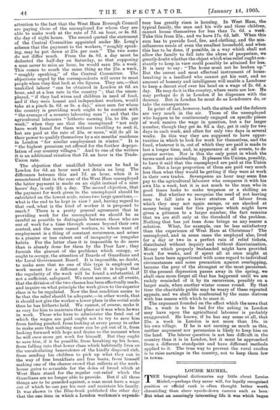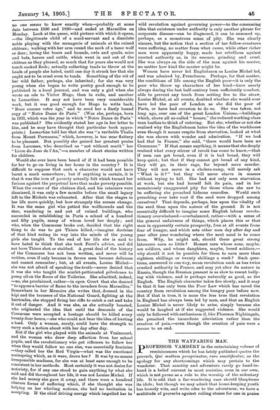T HE biographical dictionaries say little about Louise- Michel, — perhaps they never
will, for legally recognised position or official rank is often thought better worth chronicling than sheer upside-down careers such as hers: But what an amazingly interesting life it was which began
Monday. Look at the queer, wild picture with which it opens, —the illegitimate child of a maid-servant and a dissolute noble playing with the menagerie of animals at the ruined °Wean ; walking with her arm round the neck of a tame wolf or deer; loving the boars and hounds, owls and quails, mice and bats, horses and cattle, which went in and out of the chiteau as they pleased, so much that for years she would not touch cooked flesh ; actually collecting, toads to throw at the heads of people she hated, until one day it struck her that she ought not to be cruel even to toads. Something of the wit of her wild father, perhaps, she inherited ; for she was very young when she began to write poetry good enough to be published in a local journal, and was only a girl when she wrote an ode to Victor Hugo, then in exile, and another to Lamartine. It may not have been very considerable work, but it was good enough for Hugo to write back, " Beau comme votre Age," and to send her a finely bound copy of " Notre Dame de Paris." (Was she, perhaps, born in 1831, which was the year in which "Notre Dame de Paris" was published ? She evidently stated her age in her letter to him, and he may have thought that particular book appro- priate.) Lamartine told her that she was "a veritable Thalia from Mount Parnassus," which, however, is too near flattery to be pleasant. But possibly she gained her greatest praise from Larousse, Who described as "not without merit" her "Livia du Jour de l'An,"—a number of short stories written for children.
Would she ever have been heard of if it bad been possible for her to go on living in her home in the country ? It is difficult to suppose that such a character would not have burnt a mark somewhere ; but if anything is certain, it is that it was the iron of poverty actually felt which turned her furious against the perpetual laws that make poverty possible. When the owner of the chateau died, and his retainers were dismissed, it was only a few months before the small legacy left to the Michels was exhausted. After that the stages in her life move quickly, but how strangely the scenes change. It was the same girl who petted the wolfhounds and the deer, wandering in and out of ruined buildings, who succeeded in establishing in Paris a school of a hundred and fifty pupils, many of whom loved her deeply ; and who, when the Commune broke out, decided that the right thing to do was to get Thiers killed,—imagine doctrine of that kind eating its way into the minds of the young girls she taught. To the end of her life she is said to have hated to think that she took Ferre's advice, and did not have Thiers shot or stabbed. A great deal of the history of the Commune has not been written, and never will be written, even if only because in fevers men become delirious and cannot remember ; but, at all events, Louise Michel— she was not afraid of speaking the truth—never denied that it was she who taught the scarlet-petticoated pgtrolev.ses to pump oil on the floors of the Tuileries. She admitted, indeed, —no, she proclaimed, rather—in open Court that she desired "to oppose a barrier of flame to the invaders from Marseilles." Somewhere in her Memoirs she writes that, dressed in the kepi and the trousers of the National Guard, fighting at the barricades, she stopped firing her rifle to catch a cat and take it out of danger. And it was she, as she actually boasted, who originated the idea that until the demands of the Commune were accepted a hostage should be killed every twenty-four hours,—she who could not bear the idea of hurting a toad. Only a woman, surely, could have the strength to carry such a notion about with her day after day. But if the girl who played with the animals at Vraincourt, and the woman who drew deep affection from her school pupils, and the revolutionary who got riflemen to follow her when they would follow no one else, was essentially feminine —they called her the Red Virgin—what was the emotional mainspring which, as it were, drove her ? It was by no means irresponsible madness, for she was at least sane enough to be consistent in her methods. Most certainly it was not desire for notoriety, for if any one stood to gain anything by what she said and did throughout her life, it was not Louise Michel. If she had money she gave it away, and there were a hundred obscure forms of suffering which, if she thought she was helping on her whirling notions, she had no hesitation in opting. If the chief driving energy which impelled her to
wild revolution against governing power—to the consuming idea that existence under authority is only another phraie for corporate disease—can be diagnosed, it can be summed up, perhaps, as a monstrous sense of pity. She was clearly sincere, but the notion that a section of her fellow-creatures were suffering, no matter from what cause, while other richer men were apparently happy, made her rebellious against exerted authority as, in its essence, grinding and cruel. She was always on the side of the man against his master, no matter how kind the master might be.
Women have never led Englishmen as Louise Michel led, and was admired by, Frenchmen. Perhaps, for that matter, the conditions of life among the English poor—it is only the poor who throw up characters of her kind—have nearly always during the last half-century been sufficiently comfort_ able to prevent any torch from setting fire to the straw, Louise Michel, at all events, doubted whether she would ever have led the poor of London as she did the poor of Paris, or have had occasion to do so. She was taken, not long ago, over one of the great London Unions,—buildings which, above all so-called " homes," the reduced working-class man loathes to think of entering. But she, whether or not she realised why the Englishman hates the idea of the workhouse even though it means respite from starvation, looked at what she was shown with wonder and admiration. " If we had had that in France," she said, "there would have been no Commune." If that means anything, it means that she deeply realised what every stirrer of revolt has come to know,—that if men can get bread, even if it is bad bread, they will keep quiet; but that if they cannot get bread of any kind, they will go, in their rage, far beyond mere murder. They will not move in a cholera-camp, will merely ask " What is it ? " but they will never starve in masses without trying to kill. She had not only seen starvation• at work, but she had herself felt its pain, and in her monstrously exaggerated pity for those whom she saw to, be suffering she preached hideous remedies. Would such preaching ever take root if the seed were dropped among ourselves? That depends, perhaps, less upon the vitality of- the seed than upon the nature, of the ground. It is not. essentially difficult to imagine some English labour revolu-. tionary overwhelmed—overbalanced, rather—with a sense of, the general unfairness of things, which places this or that man in apparently certain prosperity, free at all events from fear of hunger, and which sets other men day after day and- year after year wondering where the next meal is to come from. Why, he might ask, should these great strong labourers earn so little ? Honest men whose sons, maybe; are soldiers, and whose daughters, maybe, breed soldiers,— why should it not be possible for them to earn more than eighteen shillings or twenty shillings a week ? Such ques- tions, answered in one way, mean revolution such as has twice crushed authority in France, and may yet alter its nature in Russia, though the Russian peasant is as slow to resent bully- ing with violence, and is perhaps naturally as good, as the English. The English character takes fire slowly, and it may be that it has only been the Poor Law which has saved the, country from revolution among the hungry poor before now. But if that is true, it is none the less true that revolution in England has always been led by men, and that an English Louise Michel is never likely to arise, simply because she would be laughed at if she suggested violence. She would only be followed with enthusiasm if, like Florence Nightingale, she preached the immediate alleviation rather than the creation of pain,—even though the creation of pain were a means to an end.







































 Previous page
Previous page